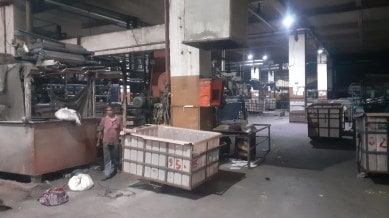Stay updated with the latest - Click here to follow us on Instagram
Bihar elections to keep Surat’s textile labourers at home for long after Diwali
Labour contractor Kamran Usmani of Sachin GIDC, who has been providing manpower to the textile mills for the last 25 years, said, “Over 55 per cent of the manpower in the textile mills are from Bihar, the remaining are from UP, and other states.

Unlike the diamond industry where the Diwali vacations were cut short to meet the festival demand, the textile units of Surat began to shut down or reduce production a week before the start of the festivities, which observers attribute to the mass outflux of migrants especially from Bihar who are heading back home for the Chhath puja and the assembly elections. Western Railways also introduced several new trains connecting eastern state with Gujarat to meet the demand.
The textile units of Surat mostly employ migrants from Uttar Pradesh, Bihar and Odisha.
monthly limit of free stories.
with an Express account.
Presently, around 400 textile mills in Surat city are operating with half of their staff, resulting in a decrease in production. Industry experts also predict that the industry will face significant workforce challenges this year in restarting its units, primarily due to the elections in Bihar.
Generally, Diwali vacation in textile mills lasts for five to six days, but this year the vacation will be of 12 to 15 days, due to a shortage of work labourers and Bihar elections.
While every year the migrants head home for Diwali and Chhath puja, this year they are likely to return only after the elections which will be held in two phases in Bihar on November 6 and 11.
The Western Railways had started many festive trains from Surat and Udhna Railway stations for UP, Bihar, and Jharkhand since a week ago. All these trains are moving fully packed, and even Udhna Railway station which was meant to unburden the Surat station, has witnessed overcrowding.
South Gujarat Textile Processing Association (SGTPA) president Jitu Vakhariya said, “On average, a textile dyeing and printing mill has around 400 to 500 labourers working in different departments. The textile mills remain operational till the night before Diwali and start reopening from Labh Pacham onwards (fifth day of Diwali). There is an enormous demand for goods (pending supply orders) before Diwali, as a result of which, the mills increase their production.
But this year, due to the ongoing mass exodus of migrant workers, the labourers have started going to their native place. They get their pending salaries online. Due to such the shortage of labourers, many factories which have 8 to 10 machines are able to operate only two to three of them, and even the labourers are paid more to work in double and triple shifts, to meet the demands of pending orders. The textile factories are running with less than 50 per cent of their manpower. We wanted to meet the production and deliver the orders on time, but due to the labour problems, we are helpless. The Railway authorities should have contacted us first, and then they should have started such festive trains.”
He further added, “The Diwali vacation is of just five to six days, but this time, due to the Bihar State elections, it would take around one month for textile mills to get fully functional. We will try to run the mills with the labour force from other states once they arrive in the city. But the production will be less.”
Labour contractor Kamran Usmani of Sachin GIDC, who has been providing manpower to the textile mills for the last 25 years, said, “Over 55 per cent of the manpower in the textile mills are from Bihar, the remaining are from UP, and other states. Due to the Bihar elections, Chhath Puja and Diwali festival, the workers have started leaving Surat and are going back to their native place. Earlier they would book tickets a week in advance but now they just buy a regular ticket and take the special train.”
He further added, “With a shortage of workforce, it is tough for us to meet the demands of textile mill owners who give us a contract for the supply of workers. Out of 55 per cent of Bihar labourers, over 70 per cent have started going to their native place, since the last few days. Similarly, 40 per cent labourers of UP are leaving Surat city. We are also helpless as a result of which, the mills are running on less than half the manpower. These labourers secretly leave the city without informing the contractors or factory staffers.”
Another labour contractor, Banshu Yadav of Pandesara GIDC in Surat, said, “In the Bihar elections, the labourers are also getting good payment for attending the public meetings. They will stay in Bihar for more than one month and will later return. Generally, the labourers from UP and Jharkhand will return, but the question is about the Bihar labourers. We will have to spend money on their travel costs to bring them back. We will also have to make tours in different districts in Bihar and UP and convince these labourers to return to Surat.”
A similar scene is in the Power Looms factories in the city. The labour force is from UP, Bihar, and Odisha, and they have started leaving for their native place in festive trains. The productions in the powerloom factories have also gone down, says Federation of Gujarat Weavers Association president Ashok Jirawala.